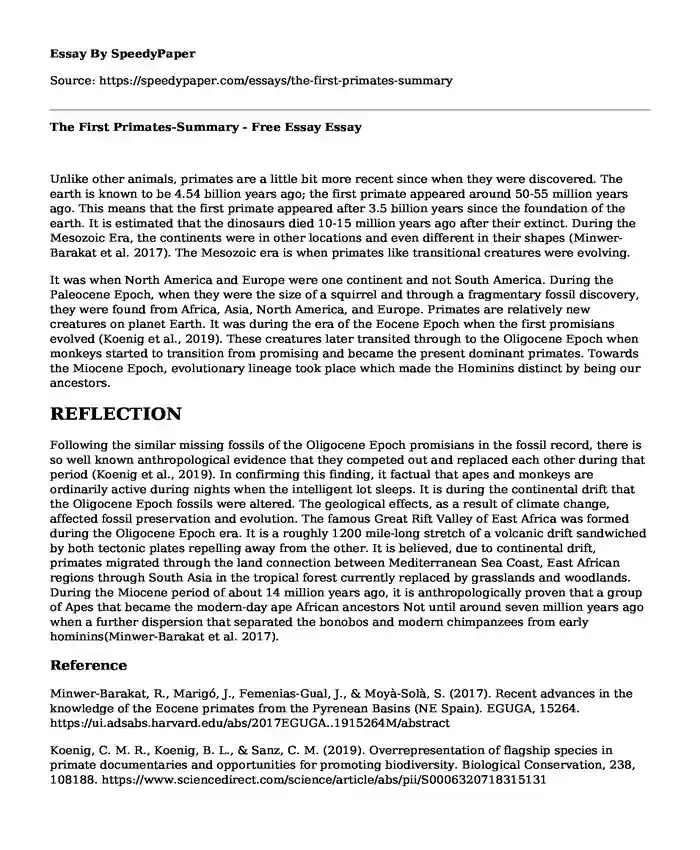
| Essay type: | Evaluation essays |
| Categories: | Knowledge Biology |
| Pages: | 2 |
| Wordcount: | 474 words |
Unlike other animals, primates are a little bit more recent since when they were discovered. The earth is known to be 4.54 billion years ago; the first primate appeared around 50-55 million years ago. This means that the first primate appeared after 3.5 billion years since the foundation of the earth. It is estimated that the dinosaurs died 10-15 million years ago after their extinct. During the Mesozoic Era, the continents were in other locations and even different in their shapes (Minwer-Barakat et al. 2017). The Mesozoic era is when primates like transitional creatures were evolving.
It was when North America and Europe were one continent and not South America. During the Paleocene Epoch, when they were the size of a squirrel and through a fragmentary fossil discovery, they were found from Africa, Asia, North America, and Europe. Primates are relatively new creatures on planet Earth. It was during the era of the Eocene Epoch when the first promisians evolved (Koenig et al., 2019). These creatures later transited through to the Oligocene Epoch when monkeys started to transition from promising and became the present dominant primates. Towards the Miocene Epoch, evolutionary lineage took place which made the Hominins distinct by being our ancestors.
REFLECTION
Following the similar missing fossils of the Oligocene Epoch promisians in the fossil record, there is so well known anthropological evidence that they competed out and replaced each other during that period (Koenig et al., 2019). In confirming this finding, it factual that apes and monkeys are ordinarily active during nights when the intelligent lot sleeps. It is during the continental drift that the Oligocene Epoch fossils were altered. The geological effects, as a result of climate change, affected fossil preservation and evolution. The famous Great Rift Valley of East Africa was formed during the Oligocene Epoch era. It is a roughly 1200 mile-long stretch of a volcanic drift sandwiched by both tectonic plates repelling away from the other. It is believed, due to continental drift, primates migrated through the land connection between Mediterranean Sea Coast, East African regions through South Asia in the tropical forest currently replaced by grasslands and woodlands. During the Miocene period of about 14 million years ago, it is anthropologically proven that a group of Apes that became the modern-day ape African ancestors Not until around seven million years ago when a further dispersion that separated the bonobos and modern chimpanzees from early hominins(Minwer-Barakat et al. 2017).
Reference
Minwer-Barakat, R., Marigó, J., Femenias-Gual, J., & Moyà-Solà, S. (2017). Recent advances in the knowledge of the Eocene primates from the Pyrenean Basins (NE Spain). EGUGA, 15264. https://ui.adsabs.harvard.edu/abs/2017EGUGA..1915264M/abstract
Koenig, C. M. R., Koenig, B. L., & Sanz, C. M. (2019). Overrepresentation of flagship species in primate documentaries and opportunities for promoting biodiversity. Biological Conservation, 238, 108188. https://www.sciencedirect.com/science/article/abs/pii/S0006320718315131
Cite this page
The First Primates-Summary - Free Essay. (2023, Oct 16). Retrieved from https://speedypaper.com/essays/the-first-primates-summary
Request Removal
If you are the original author of this essay and no longer wish to have it published on the SpeedyPaper website, please click below to request its removal:
- Education Essay Sample: How to Become an Outstanding Student
- Statement of Intent for Graduate School - Essay Examples
- Essay Example on Multiple Representations in Teaching
- Free Essay: Nike Analysis Case Study
- Industrial Revolution and the Era of Nationalism and Imperialism
- Strategies for Data Collection and Establishing Trust. Essay Example
- Free Paper: The Parents' Contributions to the Studies of Their Children
Popular categories




